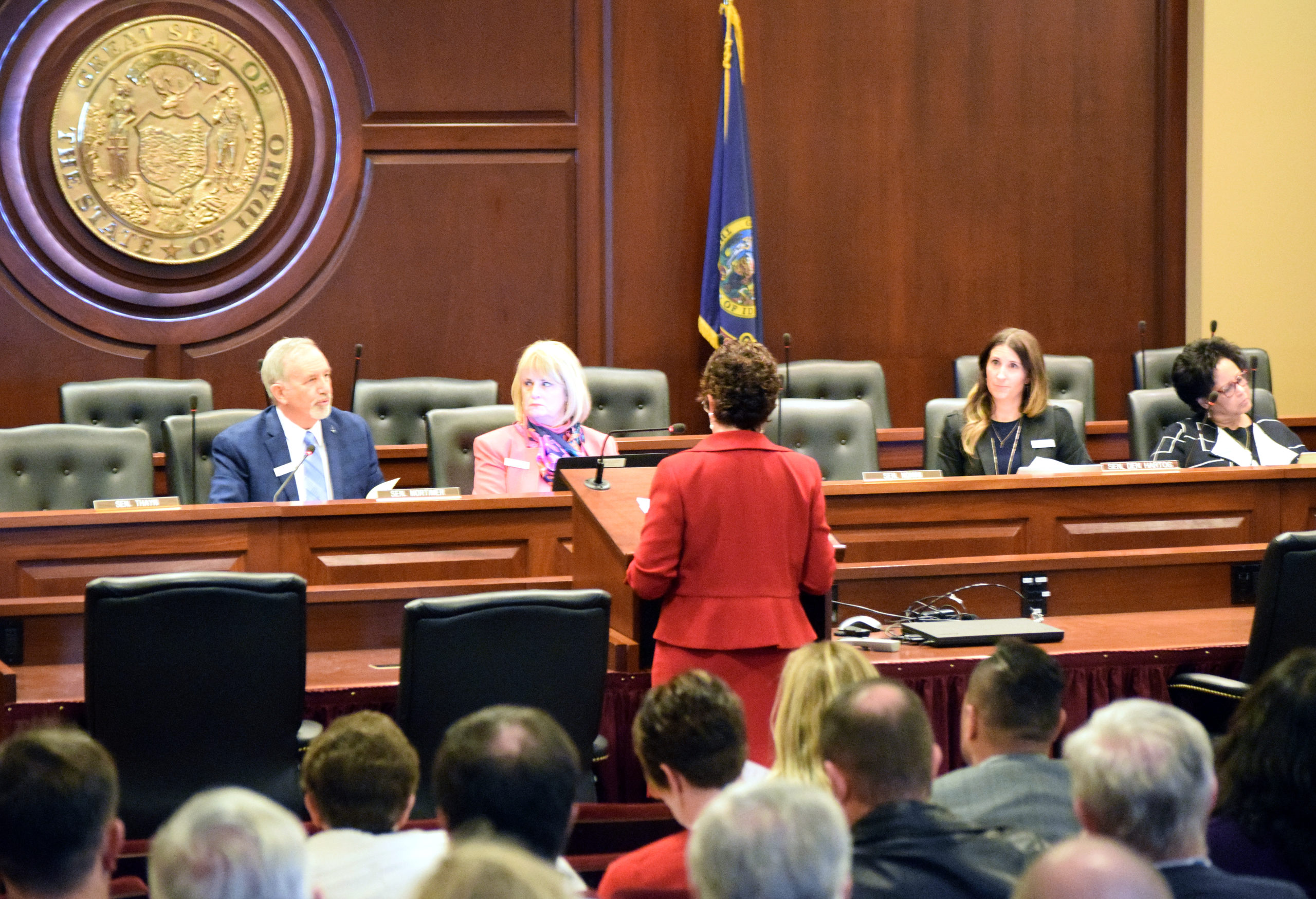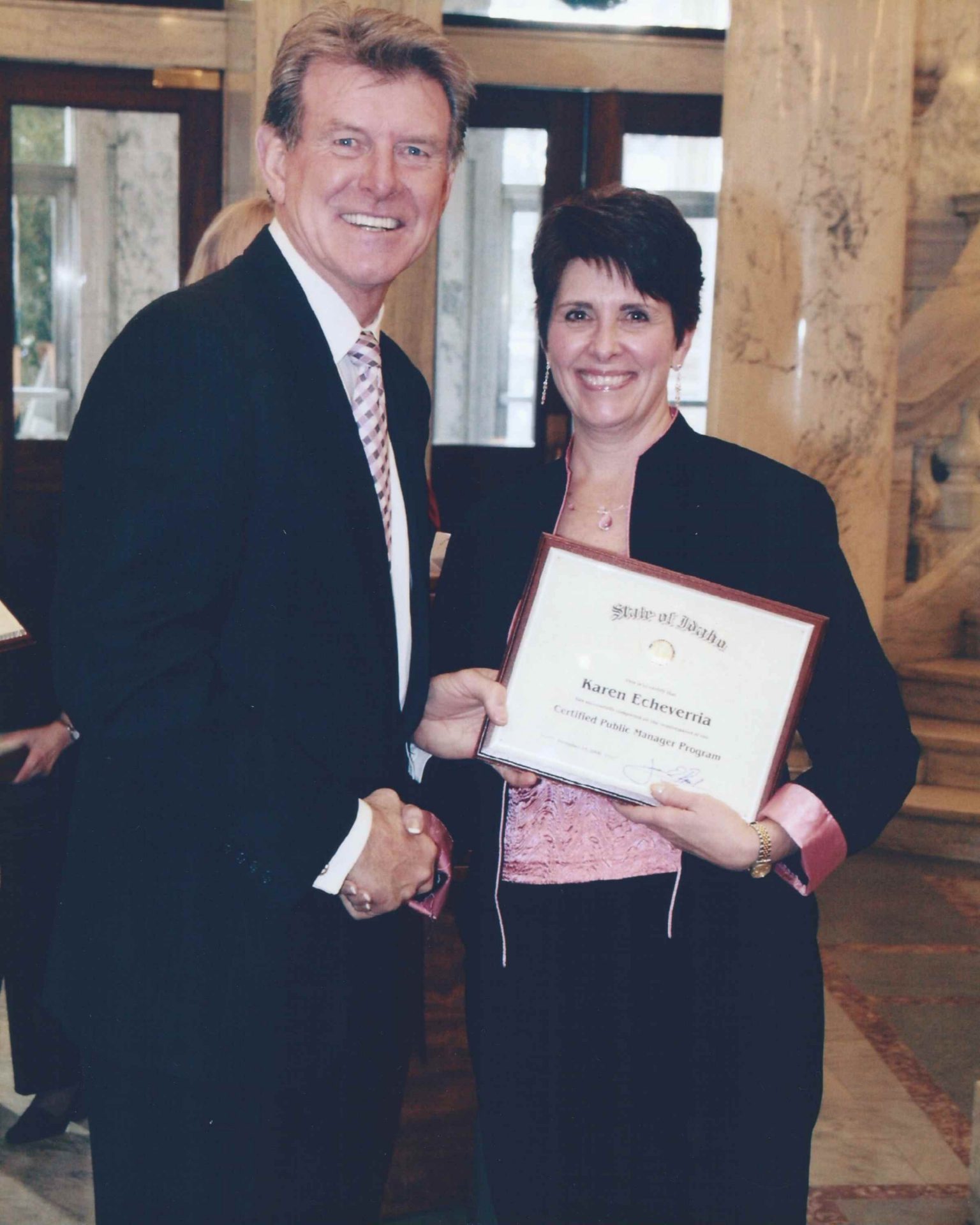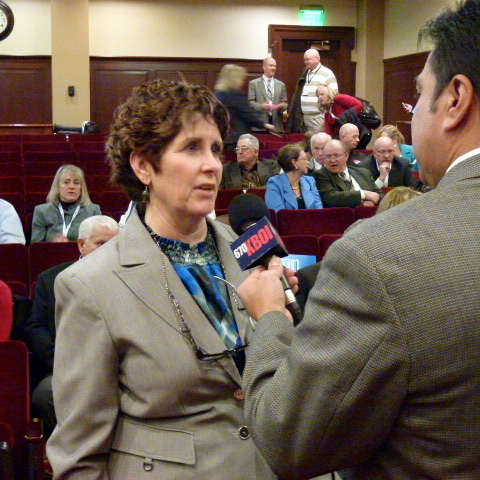Editor’s note: This story is the first in a series of profiles on notable education leaders across Idaho.
Fifteen years ago, Karen Echeverria was on the verge of unemployment, with no college degree and three daughters to provide for — one in high school, one in college and one in rehab.
She had no clue she’d soon take over the Idaho School Boards Association and transform it into a political powerhouse for public education.
On May 6, 2021, the Idaho School Boards Association formally announced Echeverria’s retirement. Her retirement date is Dec. 31, 2021.
“It’s the job I was always meant to do,” Echeverria said, between sips of wine at a pub near the Idaho Statehouse. “I wish I’d found it sooner, but I probably wasn’t ready for it.”
She started at the bottom as a government secretary with a desire to “break the glass ceiling” for women in the workplace. With some luck, years of experiences and forging relationships with the right people, she compensated for a lack of higher education to land the job as ISBA’s executive director in 2007 — as a single mom with kids.
There were setbacks and breakthroughs, losses and rewards along the way. Now on the eve of retirement, Echeverria has garnered a reputation as one of the most influential and respected state education leaders of her time.
“She’s a great ally but a terrible enemy to have,” said Patrick Sullivan, owner of Boise-based political consulting firm Sullivan and Reberger. “She knows her profession better than anyone I’ve seen, and I’ve been at this job for 40 years.”

Climbing the ranks
Echeverria and her former husband moved their growing family from Mountain Home to Boise in 1988.
He took a job as an attorney. She landed a gig as a senior secretary redrafting administrative rules at the Department of Water Resources. She went on to fill similar roles at the Department of Health and Welfare and the Office of Administrative Rules.
The jobs weren’t glamorous, but they gave Echeverria an intimate look at the intricacies and impacts of public policy and helped her create inroads with the state’s top politicos and leaders.
She learned early on how words like “and” or “or” can make a big difference in policy, an insight that’s fueled Echeverria’s insistence that ISBA staffers read all bills that impact K-12 education.
“It’s not just read the bills, but read them close enough to understand their scope and fiscal impacts,” said Misty Swanson, Echeverria’s chief deputy.
Years spent redrafting rules set the foundation for Echeverria’s ability to understand a bill’s broad impacts “in a matter of seconds,” said Sullivan. “I can do that,” he added, “but it takes time.”

Echeverria, then in her 30s, was climbing the ranks and gaining experience. She was succeeding professionally. Then, her marriage hit the skids. When her husband left, she needed to up her income to support her daughters. She landed a job as a deputy executive director for the State Board of Education in October 2002.
The position opened doors and paid more, but political posturing eventually forced her out of a job.
As Echeverria remembers it, some higher ups wanted then-State Board Executive Director Karen McGee out, but others didn’t. When a discussion about who to fire reached an impasse, both Echeverria and McGee lost their jobs.
Former State Superintendent Tom Luna delivered the news, Echeverria said, adding, “It was Karen for a Karen.” (Neither Luna nor McGee responded to questions about the firings.)
Unemployed and desperate — but skilled and well-connected — Echeverria landed a position redrafting rules for the ISBA. She did not expect that the group’s executive director would depart weeks later, and that she’d replace him.
‘What have I done?’
Echeverria spent much of the 2008 legislative session, her first as the ISBA’s executive director, assessing what she had “jumped into.”
“I thought, ‘What have I done?'” she said.
Today, the ISBA trains and consults some 900 K-12 trustees across the state, from farmers and attorneys to educators and stay-at-home moms. Lobbying for such a wide array of personalities makes up some of the organization’s most involved work.

Yet the ISBA ran no legislation in 2008, as Echeverria settled in. There were things she wanted to change within the organization first, from streamlining what she called a “sporadic, at best” process for gathering proposed legislation from trustees to training board members on the issues that impact K-12 education.
Changes came over time. By her second year as ISBA’s as executive director, trustees began speaking to their own resolutions during the organization’s annual business session — rather than deferring their time to superintendents, as they’d done in the past.
“We all appreciate the work our superintendents do, but they have their own association where they can move issues forward,” Echeverria said. “We are the school boards association.”
Trustees also began finding their own area legislators to sponsor their would-be bills — another effort spearheaded by Echeverria.
Echeverria also grew her staff — from six when she took over to 10 today — to help handle expanded services for trustees.
By 2013, the ISBA and its members directly impacted nearly half a dozen bills tied to K-12, including a controversial one that sought to limit master labor agreements, which normally occur between school boards and teachers’ unions, to a one-year duration.
Echeverria led the push, partnering with then-Senate Education Chair John Goedde to print the legislation on a party-line vote amid opposition from the state’s teachers union.
The resulting law gives school boards more leverage in negotiations with teachers. Echeverria considers it her biggest legislative achievement.
Today, the ISBA staff members typically track some 60 bills during the session, and they testify, seek votes or send floor notes on at least 20 others.
‘No fluff’
“Karen has a good team that’s effective at fleshing out legislative priorities from trustees,” said retired director of the Idaho Association of School Administrators Rob Winslow, who spent 11 years working alongside Echeverria at the Statehouse. “But she may be even more effective at getting those things passed.”
House Speaker Scott Bedke, who calls Echeverria before each legislative session for a rundown on the year’s K-12 agenda, also pointed to her savviness under the Statehouse rotunda: She knows when to push and not to push, he said.
But it’s Echeverria’s expertise on the issues that prompts an annual call from Bedke. “She’s distinguished herself as someone with good ideas over the years,” he said. “She’s going to be missed.”
Marg Chipman, a trustee in the Weiser School District who’s become a friend of Echeverria’s, spoke from the position of a school board member.
“We’ve had lobbyists in the past, but never anyone with her clout because she devotes herself 100 percent to anything she takes on,” said Chipman.
Sullivan pointed to Echeverria’s more subtle attributes: “She has this way of speaking so directly, with no fluff, that’s just clear and concise and matter-of-fact.”

Wins and losses
Losses have also accompanied Echeverria’s time at the ISBA — personally and professionally.
She pushed vigorously in 2013 for a bill allowing school boards to float a “last best offer” in the event of a negotiations impasse — only to see it die after months of work. She considers it her biggest legislative failure. “I really wanted that one to pass.”
Helping school board’s comply with Idaho open meeting laws is another recurring challenge, Echeverria acknowledged. Compliance has been a struggle for several ISBA-member districts over the years, from Nampa to Marsh Valley to Sugar-Salem.
But trainings and other compliance outreach for dozens of school boards can only go so far. “You can’t force them to read everything that you send out,” Echeverria said, adding that she’s noticed a correlation between districts that don’t take advantage of ISBA training opportunities and those called out for breaking the law.
Yet the hardest part of her job, Echeverria said without hesitation, has been managing people.
An admittedly detail-oriented person, she balances her perceived shortcomings at the office by hiring creative types. The only problem: Creative types don’t always get their work done on time.
“I have to stay on top of that,” she said, clapping her hands.
Echeverria’s staff represent another top priority for her over the years: helping women advance in the workplace.
“My job is to teach them how to do my job,” she said, referencing her staff of eight women and two men. “Someday they’ll replace me, and I need to do my part.”
Echeverria wouldn’t “change anything major” about how she managed her home and professional lives over the years, though in retrospect, there may have been a “missed event or two” she would have chosen to attend.
Her daughter Shawn Jones, a social worker in the Boise School District, sees it differently. Her father’s sudden departure from their home and Idaho during her high school years, along with a sibling’s struggles with substance abuse, were difficult issues, Jones said, but her mother handled things like grocery shopping and cleaning up the house with “such grace.”
“She did it all,” said Jones. “I never knew she was spread so thin.”

